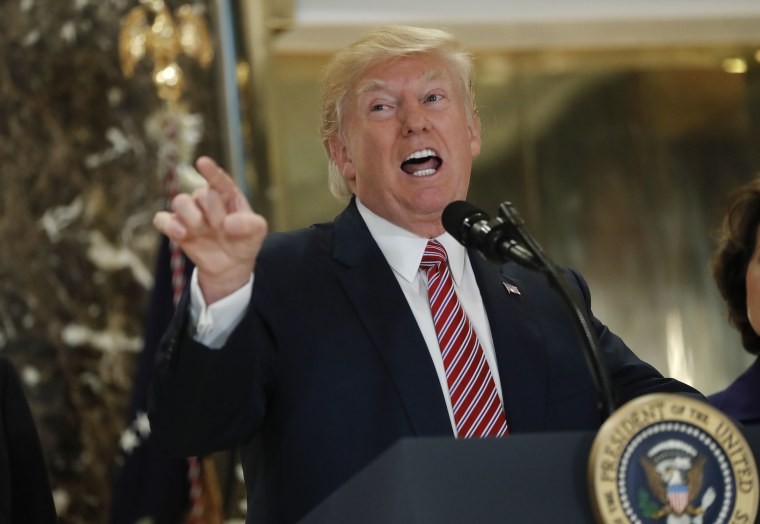In the public discourse, certain words and phrases become a convenient shorthand for partisans. "Judicial activism," for example, generally means "court rulings that conservatives don't like." Similarly, "socialism," at least in Republican circles, is synonymous with "progressive policymaking."
The shorthand rhetoric is often misleading, and usually lazy, but it also tends to be inconsequential. If anything, the overuse of these words and phrases ultimately strips them of the value that made them worthwhile in the first place.
Donald Trump, however, has his own rhetorical quiver, which he turns to a little too often, routinely pulling one especially provocative arrow. Here, for example, was the tweet the president published overnight.
"I think what the Democrats are doing with the Border is TREASONOUS. Their Open Border mindset is putting our Country at risk. Will not let this happen!"
As everyone involved in the debate already realizes, congressional Democrats do not actually support an open-border policy. The Obama administration increased border security to all-time highs, and Democratic lawmakers have repeatedly tried to work out bipartisan compromises with the White House that would further strengthen border security. Trump has turned down each of the offers.
But it's that first sentence in his tweet that stands out: "I think what the Democrats are doing with the Border is TREASONOUS." What Dems are "doing," in this case, is balking at the president's border agenda -- to the extent that the White House has an actual agenda -- and choosing not to give Trump everything he wants.
A skilled president, at this point, might try to open policy negotiations in the hopes of reaching an agreement. This president turns to Twitter, to accuse his perceived enemies of "treason."
If this sounds familiar, it's because Trump keeps using this same word -- far more than he should -- without fully understanding what it means.
Indeed, last night's tweet wasn't even the first time yesterday he'd thrown around accusations of treason. Just hours earlier, as part of an odd tantrum, Trump said federal investigators in the Russia scandal committed "treason."
Last month, the Republican made similar comments to Fox News' Sean Hannity, insisting, "It was treason. It was really treason." Trump added, "You're talking about major, major treason."
It followed social-media content that the president promoted last November, which included text that read, "Now that Russia collusion is a proven lie, when do the trials for treason begin?"
A couple of months earlier, the New York Times published a rather extraordinary op-ed, written by "a senior official in the Trump administration," describing a White House in which "many" officials work diligently behind the scenes to subvert Donald Trump. The president suggested the newspaper may have committed "treason" by agreeing to run it.
A few months before that, the president was so bothered by media coverage of his summit with North Korea’s Kim Jong-un that he described the reports as “really almost treasonous.”
And a few months before that, while whining that Democrats failed to applaud his State of the Union address to his satisfaction, the president said Dems "certainly didn’t seem to love our country very much” -- and then raised the prospect of Democratic “treason.”
As regular readers may recall, “treason” is a specific, legally defined thing. It refers to “levying war” against the United States or providing “aid and comfort” to an enemy of the United States. It is a capital offense, and those convicted of treason are subject to execution.
To know Trump is to realize he routinely uses words he doesn’t understand, so it’s entirely possible that he’s simply confused about the actual meaning of the word “treason.” More alarming, though, is the possibility that Trump isn’t satisfied with the real definition, and he’d like to expand its meaning to include criticisms of his presidency and/or standing in the way of his agenda.
Given his authoritarian tendencies and public praise for the leadership styles of totalitarian leaders, the latter is an unsettling possibility.
